TUESDAY EDITORIAL
Murder, mayhem and fighting crime in Gauteng – what’s all the fuss about the amaPanyaza?
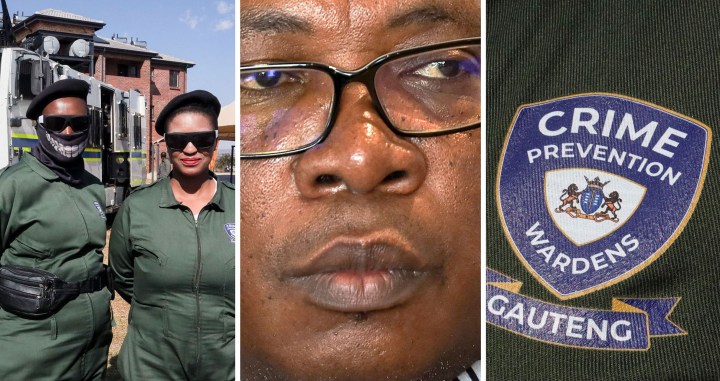
When Panyaza Lesufi became premier of Gauteng in October 2022 he was fully justified in declaring that fighting crime was one of his ‘apex priorities’. The levels of crime in Gauteng make life in this province akin to living in a war zone. It’s not an exaggeration to say that all of us who don’t have blue-light escorts and 24-hour security guards (the 99%) live in a state of fear.
The latest SAPS statistics for Gauteng (compiled by the SAPS Crime Registrar) bear this out. During the 90 days of April, May and June 2023 there were:
- 1,489 murders;
- 1,910 rapes;
- 8,057 burglaries at residential premises;
- 4,714 motor vehicle thefts; and
- 2,068 kidnappings.
Literally tens of thousands of people are harmed by these crimes.
Unfortunately crime is not often talked about as a human rights issue, and fighting crime doesn’t get enough attention from civil society. But it is, and it should be. It’s a public health issue, a mental health issue, a children’s rights issue, an education issue, a gender issue. In fact, crime violates many of our constitutional rights: to life, to safety and security, to human dignity, to privacy, to bodily autonomy, to choose a trade or profession.
But once again, even though the middle class are the loudest in their complaints (and I don’t begrudge this), the people most vulnerable to crime are the poorest of the poor; those most vulnerable are black women and children. The least-policed areas are our townships and informal communities.
As we have reported before, the lack of policing in poor areas has driven a dramatic rise in vigilantism and mob violence. In Gauteng, 95 people died from what the police themselves call “mob justice/vigilantism” in those 90 winter days between April and June. One a day…
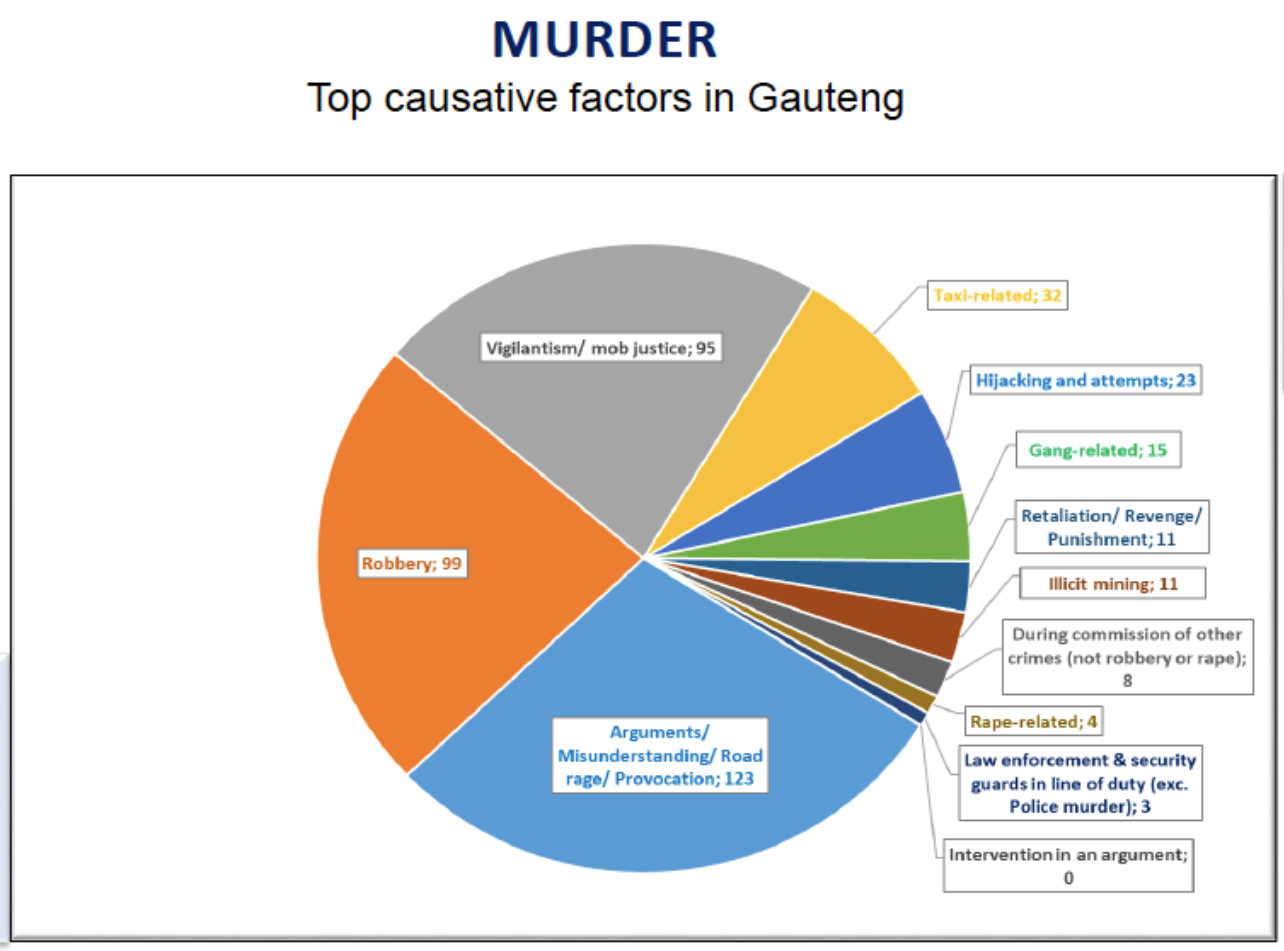
Gauteng crime statistics, April to June 2023.
Way back in 2014 the Commission of Inquiry into Policing in Khayelitsha in the Western Cape found gross inequalities in people’s access to safety and security and made recommendations for policing that should have been implemented nationally.
But, as happens with commissions on inquiry, nearly 10 years later, not much has improved. In fact it’s worse.
In this context it’s not surprising that people want drastic visible action against crime.
Unusually for a politician, premier Panyaza Lesufi has acted very fast in recruiting, “training” and deploying nearly 6,000 Crime Prevention Wardens (CPWs) across Gauteng.
Shouldn’t he be given credit instead of criticism, you might ask?
We would love to say yes. But our answer is no, and we give three reasons:
One: Premier Lesufi has worked outside the rule of law in establishing the wardens
As we have explained, Lesufi recruited, trained, financed from public funds and deployed the Gauteng CPWs before obtaining legal authorisation from the minister of justice under the Criminal Procedure Act.
There is therefore no legal basis for their operation.
Read more in Daily Maverick: Gauteng Crime Prevention Wardens set up unlawfully: experts
Why does that matter?
One of the founding provisions of the South African Constitution is to declare our country a democratic state founded on “the supremacy of the Constitution and the rule of law”.
Working outside the law, even in a crisis, puts us on the road to authoritarianism. It diminishes transparency, which decreases accountability and increases the dangers of distrust. In the context of widespread fraud and corruption in Gauteng, the fact that the CPWs are part of a R4-billion programme should alert us to the potential – once again – for corruption, particularly in procurement of goods and services.
In our investigations, we have not yet found any evidence about where the CPWs fit in an anti-crime strategy, either at national or provincial level.
We celebrate that South Africa is a constitutional democracy. This means that one of the first expectations we have of politicians is that they know the law and abide by it. As we have seen, in matters of urgency, politicians, especially the President and premiers, are empowered to ensure that laws and regulations are passed urgently. They just have to do their job properly.
But that has not happened here.
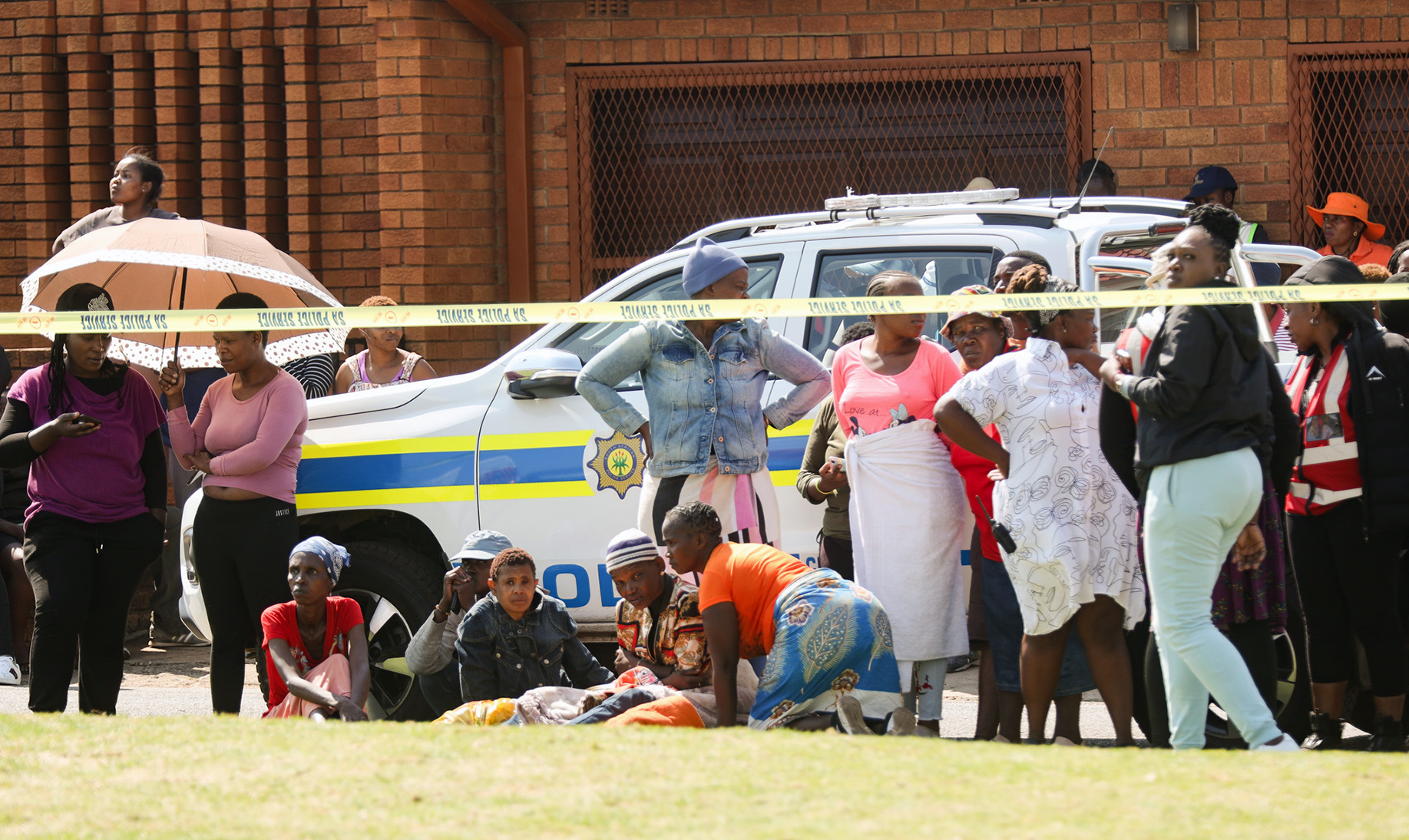
The scene in Rockville, Soweto, where one of the mutilated bodies of two boys was found on 20 April 2023. They were reportedly discovered early in the morning by residents at different locations in the township. (Photo: Gallo Images / Fani Mahuntsi)
Two: The wardens are very inadequately trained and may themselves become a danger to the public.
Putting 6,000 crime prevention wardens on the streets sounds like a good thing. But our investigations have unearthed evidence that the CPWs have been hurriedly and poorly trained.
Being badly trained is first and foremost a danger to the wardens themselves, since crime is so often violent.
But poor training and poor remuneration – the CPWs are paid about R6,000 per month compared with premiers who get a cool R2.5-million plus VIP protection – also increases the risks that the wardens may abuse their power and act unlawfully against members of the community.
Daily Maverick has already exposed at least one instance of a violent abuse of power (read about it here). Making matters worse, we have found out that the mechanisms to make complaints against CPWs are opaque and the powers of bodies like the Independent Police Investigative Directorate do not extend to the wardens.
Of course, we would all love to trust Lesufi, but we should guard against potential dangers. Without sufficient oversight is there a danger that some CPWs could be abused as a paramilitary force against political opponents and critics, including independent social movements? In this context the name “amaPanyaza” already associates them with doing the bidding of a politician, not the public.
This is not a fiction of imagination. South Africa has a history of armed vigilantes enforcing the power of politicians. One of them just died. Next year is a pivotal election year. Just be on your guard.
Three: The wardens are not a strategy that will succeed in containing serious and violent crime in Gauteng
In our investigations, we have not yet found any evidence about where the CPWs fit in an anti-crime strategy, either at national or provincial level. The Gauteng Safety Strategy 2015-2020 is three years out of date. A new strategy is yet to be published. To us they feel more like a good-sounding idea that the premier woke up with one morning and then decided to implement because it would increase his popularity.
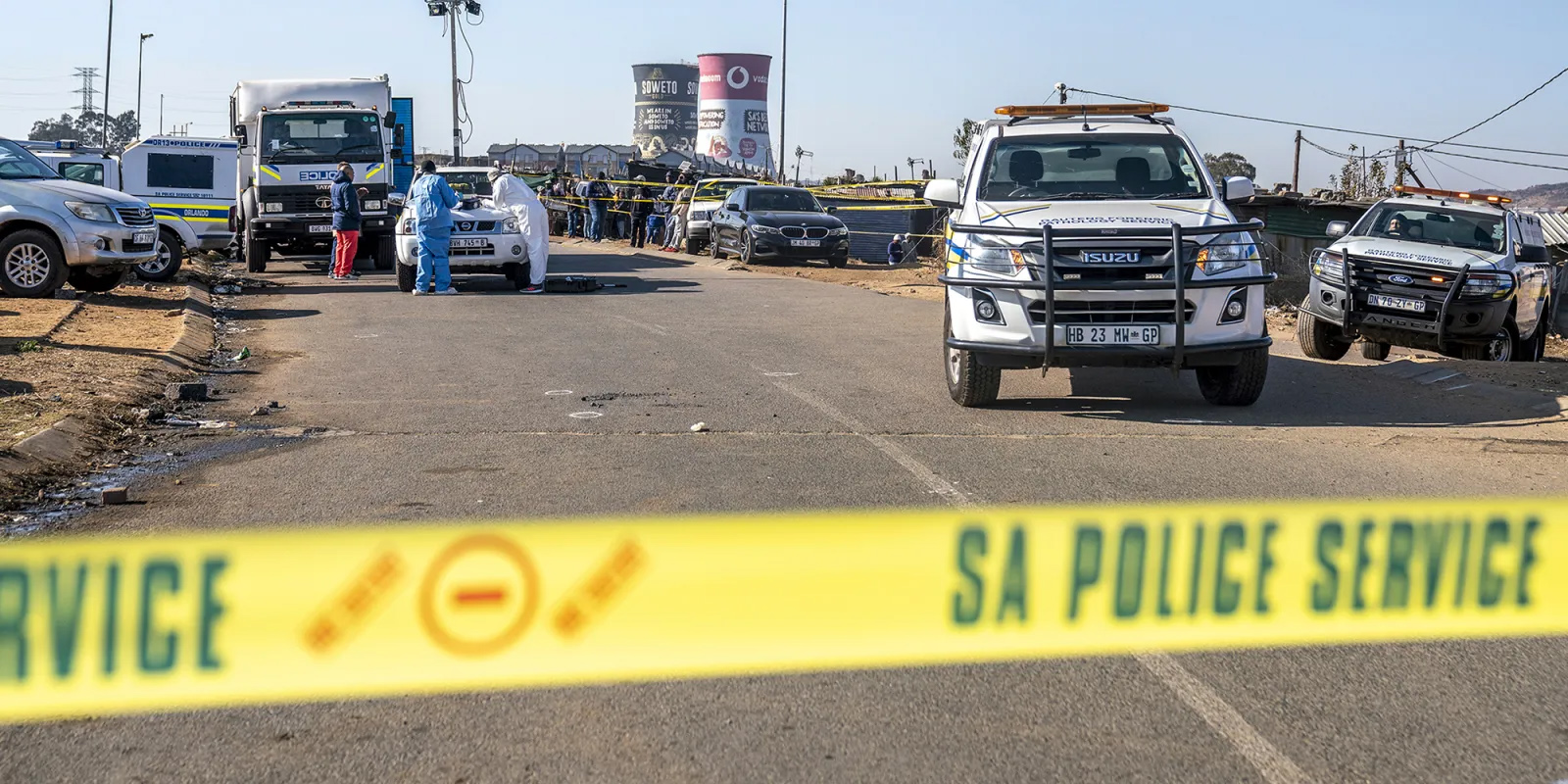
The scene of a shooting at the Mdlalose Tavern in Nomzamo Park, Soweto, on 10 July 2022. (Photo: Shiraaz Mohamed)
As part of our research into this issue we have talked to experts in policing. They all express concern that the CPWs are in fact the wrong strategy for the Gauteng government to be pursuing to make communities safer.
As there is a crying need for jobs and crime prevention, when it’s a matter of life and death people shouldn’t be fooled by expensive vanity projects.
As the SAPS stats reveal, the biggest problems are the crimes of murder and violent robbery. Commenting on this, a statement issued by the Institute of Security Studies in March 2023 states that in South Africa:
“When compared with the size of the population, a small number of people commit the most serious violent crimes, particularly murder. The police make well over a million arrests each year. However, these arrests are not resulting in fewer murders or in reductions of the many other forms of violent crime. That suggests they are targeting the wrong people.”
The statement adds:
“Purposeful steps must be taken to focus on the people, places and behaviours most associated with lethal violence, and to strengthen the investigation and prosecution of murder.”
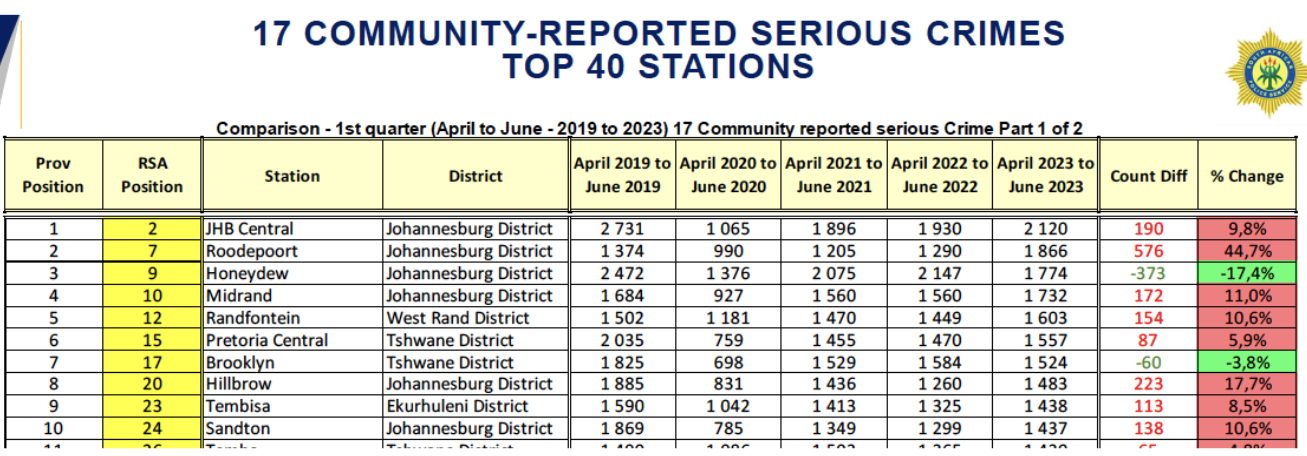
The top 10 worst areas in Gauteng (Police-recorded crime statistics, April to June 2023).
One expert we spoke to said that while a “second tier” of community-based policing could be justified, particularly to ensure “visible policing”, its success depended on care in recruitment, vetting, quality of training, systems of oversight, and accountability. With these checks and balances in place (and we believe they are not) CPWs could complement crime prevention. But without them the expert called it “a recipe for disaster” and a “wasted investment”. In particular, he appealed, “at all costs keep firearms out of their hands”.

Gauteng has the dishonour of hosting 13 of the top 30 worst crime districts in the country. (Image: iStock)
If we accept this analysis, then it’s clear that allocating R4-billion to the CPWs is riddled with problems. What the Gauteng government should be doing is spending more money on strengthening the capacity of existing police and police stations. It should be using the intelligence it has about where the highest levels of crime exist (Gauteng has the dishonour of hosting 13 of the top 30 worst crime districts in the country) and tackling it systematically, police station by police station.
It doesn’t appear to be doing that. We appeal that it does.
So, much as there is a crying need for jobs and crime prevention, when it’s a matter of life and death people shouldn’t be fooled by expensive vanity projects. Provincial spin doctors may have taken offence that we haven’t sucked up the spin so far. But sorry, high public office demands high public accountability. And at the end of the day it’s our right to life that’s at stake. DM








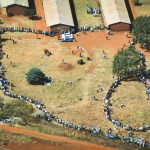











 Become an Insider
Become an Insider
Beautiful analysis and rebuttal of just another populist, money wasting, vote grabbing play by a politician who really is out of his depth, no matter what he says.
Thank you Mark – it’s an excellent analysis!
In addition to the facts that you have outlined I have serious concerns with respect to the funding of this project. I believe Panyaza was quoted as saying that the money was found in ‘savings’ from other departments of Govt – when it would have been more truthful of him to use the word ‘cuts’
This is part of the problem. Whether its Tswane or Johannesburg – we have no money & the financial situation in the Province will continue to deteriorate. I can almost guarantee that this ‘vanity project (because that is what this is & what Panyaza is all about) will get canceled next year. When that happens Panyaza will be nowhere to be found except to point fingers at others.
As you say; who doesn’t want all of our residents to feel safe? Who doesn’t want our Kids to find work & feel some kind of dignity? This project will ultimately however deliver neither of those two things & will be found to be yet another waste of money we don’t have! My loathing of this Man is only surpassed by the love he has of self!
Confused by the discrepancy between the pie-chart which categorises 424 murders for April to June and the listed total of 1489 murders. Does this mean there is no known “causative factor” for more than 1000 murders?
Simply put it is a worse than useless approach by a worse than useless premiere under a worse than useless government.
Mark, what you are suggesting requires thinking prior to action. We all know that those who govern are incapable of doing that.
An excellent analysis. Chaos and criminality lead people to vote for authoritarian leaders who will be tough on crime: look at the lawlessness of Russia in the 90s and along came a hard man who promised to sort it it out. When the perception that criminals have more rights than victims grows. then those rights are at risk. The incompetence and corruption of the ruling party, especially that cat in the hat Cele, have created a multitude of dangers to our democracy.
So good to see human rights in the context of both victimisation and response to crime. As premier, Lesufi has a much bigger opportunity at his fingertips, to ensure the delivery of multiple mandates of his departments, that can have a significant impact on both, and use his wardens not to ‘fight’ crime but to help prevent it. Only the police should ‘fight’ crime. Language counts: the wardens are not soldiers and should not be encouraged to think that they are at war. We have a complex social problem that makes us all vulnerable and we should deal with it in a systemic way, starting with compassion and empathy for everyone caught in this ugly cycle of crime and violence.